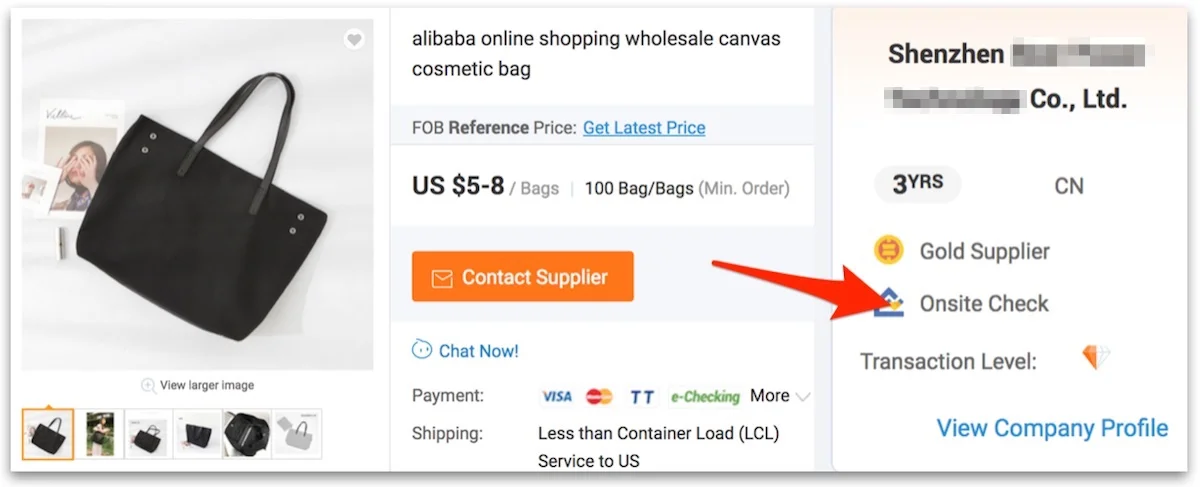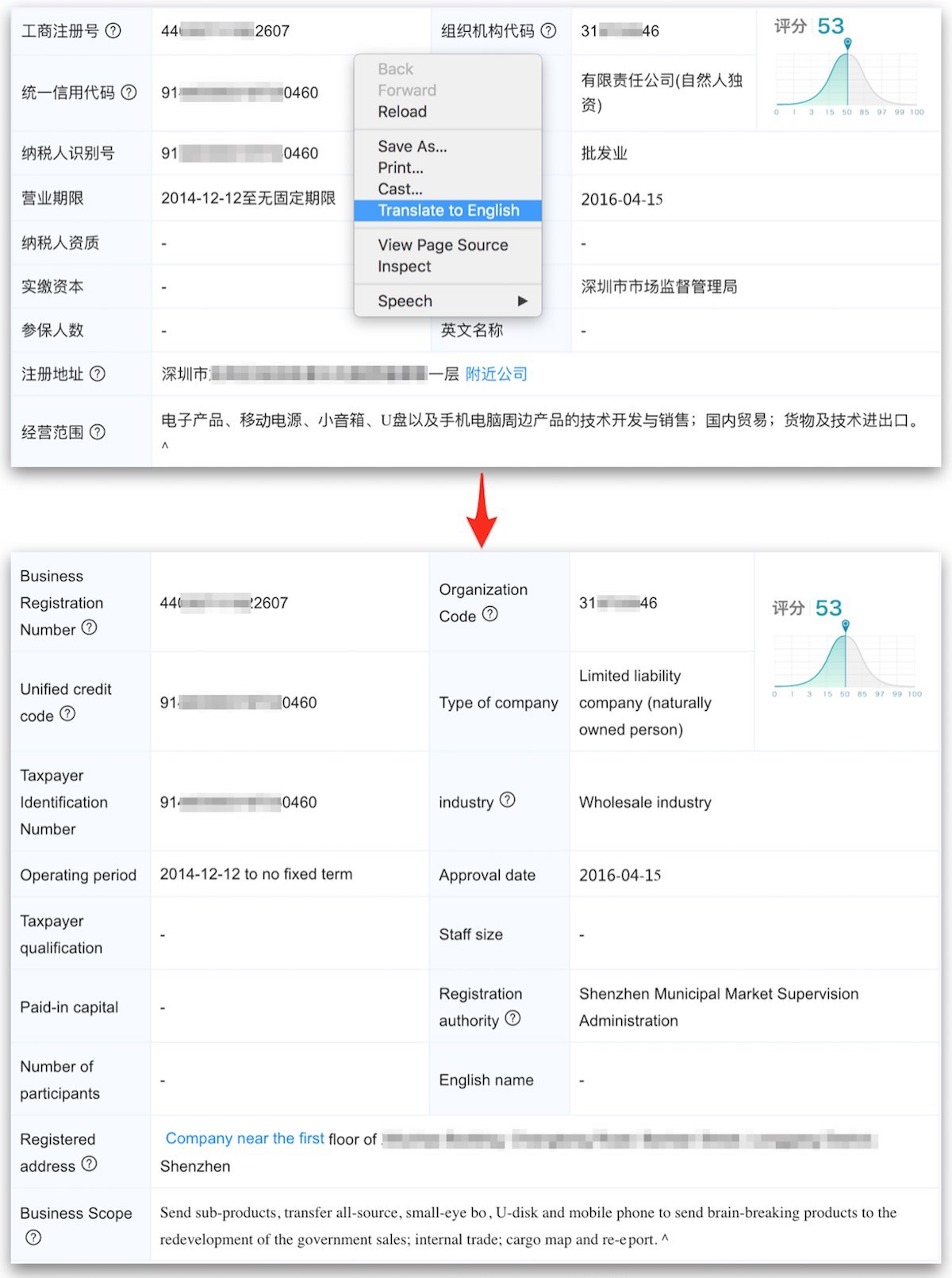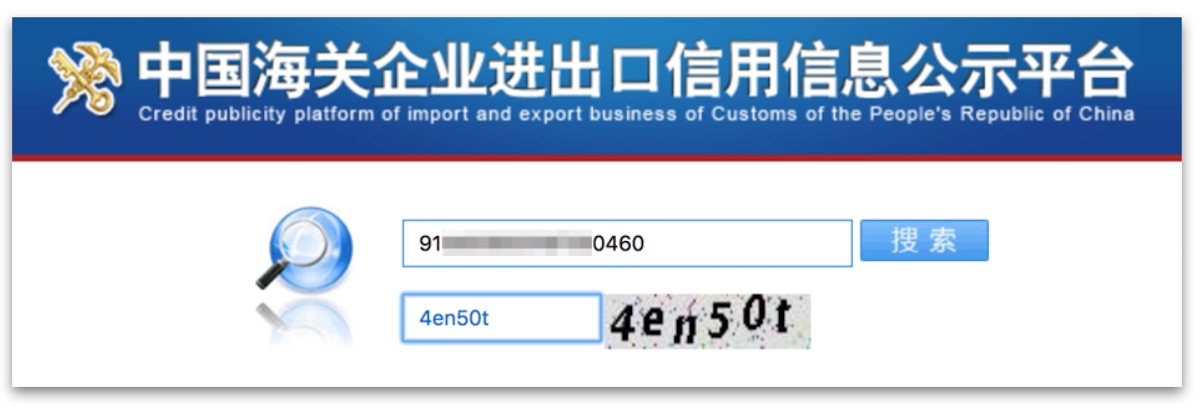Verify Chinese Suppliers Online: A Step-by-Step Guide
/If you’re reading this article (which you clearly are), I bet you have read a lot of great articles about how to verify Chinese suppliers.
These articles always tell you two things:
Filter suppliers through company information on Alibaba;
Check their professionalism through the way they respond to your emails.
With such methods, you may be able to get a list of relatively reliable suppliers in DAYS (or WEEKS).
This one is different. It takes hours, not weeks.
What’s even better, is that you don’t need to contact anyone during the process.
Here are the tools I will be using:
Not all of them are essential, but they can help you find the most important information in the shortest possible time (even if you don’t know Chinese at all!).
Let’s get started.
Step 1. Find the supplier’s Registration Number on Alibaba
If you used to search for suppliers on Alibaba.com, you should have noticed that they always provide very detailed supplier information.
Unfortunately, such information is often unreliable.
In the following, I will use an actual case to prove this.
By searching for the keyword “cosmetic bag”, I found this bag manufacturer on Alibaba.
It has been trading there for three years, and has undergone the on-site check.
Looks good, isn’t it?
Now let’s take a look at its homepage.
Well, it looks unremarkable, but we can hardly find any flaws on it.
If you are an expert in using Alibaba, you will never miss its company information page.
Nothing suspicious.
You must have noticed the orange text on the right side of the page. That means Alibaba has verified it as a manufacturer.
After checking this, many people will tell themselves:“ Well, it’s indeed a bag factory.”
Or is it?
NOTE: Alibaba charges EACH supplier at least $5,000 each year (this does not include any promotion fees), and its sales staff’s commission is as high as 10%. That gives them a strong incentive to help suppliers make fraud.
Let's click here and see what we will find.
Now we have entered a very simple web page which contains a string of numbers and an English company name.
And this string of numbers, is the most important information you REALLY should look for.
It’s the supplier’s Registration Number, you can use it to find all public information about it.
Let us make a note of its Registration Number and move on to step #2.
Step 2. Check its legitimacy
Obviously, no one will be willing to deal with a company that has gone bankrupt.
So our entire verification process begins with the legitimacy.
There are quite a few tools capable of doing this, such as:
They both are good options for me, but if you don't understand Chinese, I strongly recommend that you use QiChaCha for a simple reason:
Anti-bot verification.
I suppose the anti-bot pages you saw in the past are mostly like this:
But on CECIPS’s website, they look like this:
You need to find all the Chinese characters on the picture and click on them in order. You can use the guessing method to pass it, but you surely won’t enjoy the process.
So let's start our checking with QiChaCha.
On the homepage of QiChaCha, there is a huge search box.
Let’s enter the Registration Number there, then click the button on the right.
Now that we have entered a new page, here we can find some important information:
Legitimacy: if the text is RED, that means it’s no longer a legal entity. STAY AWAY!;
Chinese company name: you can use it to find some information;
Registered capital: the bigger the better, but don't take it seriously.
So it seems that this supplier has passed our preliminary verification.
Let's move on to step #3 and dig deeper.
Step 3. Check its Business License information
If you asked me what method you should use to verify that a supplier YEARS AGO, I would tell you:
Ask your supplier to provide a clear photo of their Business License;
Find a reliable Chinese agency that provides company verification service;
They will arrange an employee to the local authorities and verify the authenticity of the license;
If everything goes well, they will translate the contents of the license into English and mail it to you.
This will cost you 2-3 business days, and hundreds of dollars.
NOTE: There are professional organizations that provide such services in China at reasonable charges, such as China Checkup and Verify China.
Things have changed.
Since the Chinese government has disclosed the Business License information of all companies to the Internet, you can do most of the work on your laptop.
Let's start by clicking on the supplier's Chinese name on QiChaCha.
Now we jump to a page full of Chinese text.
It’s the Business License information we are looking for.
Can’t you read Chinese? Don't worry, we can translate it into English using Chrome's web translation feature, just like this:
Things seem to go smoothly, most of the content have been translated into English, BUT...
You must have noticed: the Business Scope column (which is the most important one) is filled with gibberish.
How is this going?
To figure this out, I checked the code of this page.
I found that for some reason I don't understand, QiChaCha has encrypted this part of the content, which is why the web translation function does not work.
You don't need to be a computer expert to find out that a lot of characters have been replaced.
Fortunately, we still have a plan B: Baidu Translate.
It’s a versatile translation tool provided by Baidu, China's most popular search engine.
You just need to drag a screenshot and drop it in, it will automatically recognize the Chinese characters in it and translate them into English.
Let's try it out.
Perfect!
With the help of the image translation tool, we found two secrets of this so-called bag factory.
It is a trading company and is NOT licensed to manufacture any products;
It operates the ELECTRONICS PRODUCTS business and has nothing to do with the bag.
I bet if you ask them, they will find all reasons to explain it, but I must say that its Business Licenseinformation is very abnormal.
So what is the normal Business License information of a manufacturer?
This is the business scope of the manufacturer of the iPhone X, we can find many keywords related to manufacturing mobile phones at a glance.
NOTE: If you want to get an accurate translation, I suggest you go to a professional online translation service provider like RushTranslate, which will probably cost you around $20.
So, if you have always regarded Alibaba as a trusted source of supplier information,
it’s time to reconsider this.
Let’s continue.
Step 4. Check its Import-export License
If someone want to export some goods from China, there are usually two choices on the table: to fill in all the customs declaration documents by myself, or find a customs broker and let them handle all the matters.
But to do this, his company MUST be a legitimate international trade operator and have an Import-export License first.
If not, then he have only one choice left: to fake the documents.
In China, there are many underground customs brokers that provide such service.
On the surface, they operate international trade business, but in reality, they will help companies that do not have (or have been revoked) Import-export Licenses export goods in the name of their own company.
Technically, such an approach is absolutely illegal. But for a long time, Chinese law enforcement agencies have been blind to this practice, and few companies have been punished.
But remember, few ≠ no.
Although many companies do not verify Import-export Licenses when looking for suppliers, I strongly recommend that you do this. There are three reasons:
Since suppliers without Import-export Licenses cannot legally accept foreign exchange, they will ask you to wire the money to the underground broker’s account (or a private account). Although this requirement is reasonable, it increases your risk of fraud;
Some underground customs brokers are involved in serious criminal acts (such as smuggling), which may result in your goods being seized by customs;
If the financial status of your supplier's underground customs brokers is unstable, they may suddenly disappear with your payment (even if your supplier is innocent).
Next, let us verify whether our “bag factory” can legally operate international trade business.
When I was checking its company information on Alibaba, I noticed that Alibaba had verified its English company name.
It seem to be a good sign.
In China, the first step in applying for an Import-export License is to register a English company name (obviously).
If so, we can find it in the database of the Ministry of Commerce:
In my career, I see many Chinese companies arbitrarily fabricating their English names, and the company name in this database is the only one with legal effect.
So let's verify that our bag factory's English name is the same as the one on Alibaba.
To achieve this goal, you only need to enter its Registration Number and the verification code...
And...
Oh, great.
So our bag factory is neither a real factory nor a legal international trading company.
Good for you, Alibaba!
To prevent any possible mistakes, let us give it a last chance.
If it has an Import-export License (which is very unlikely), then we also find it in the database of the General Administration of Customs.
Nothing at all.
If it has an Import-export License, then you should be able to see a informative webpage like this (translated with Chrome):
NOTE: Even if your supplier has an Import-export License, you may not be safe. Some companies will cooperate with underground customs brokers to evade taxes. The best thing you can do is NEVER EVER wire money to any bank account other than your supplier’s, no matter what excuses they told you.
And… DONE!
A full company verification is a much lengthier process, but this is a great way to kick start. By following these steps, you can learn a lot of important information that your Chinese suppliers don't want you to know.
If you have any questions or have any tips you would like to share, just reach out to us.




























